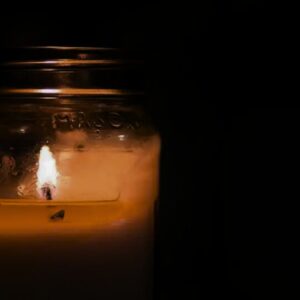Often we use words like “brave” to describe poems that take tremendous emotional or psychological risk, whether imagined or recalled (though most often some intermittent shade between the two). The false consciousness lurking in such praise, of course, is the illusion that a poet, or any writer, is really writing from a position of strength and invulnerability to begin with; that they have made or continue to make a conscious choice that leads them to confront, to formalize, to speak to what the rest of us might shrink from. This the exact type of slippery fog that I find the poems of Brenda Shaughnessy, whose new book So Much Synth is released this week, brilliantly burn away. Indeed, Shaughnessy’s poems come often at a visible cost for poet and speaker alike: to describe the complexities, traumas and incompatibilities of queer inner life (as much as her familial one) amid the cold noisy backdrop of a busy world. In the first poem, “Why I Stayed 1997-2001,” an abusive relationship is pivoted at from many, even contradictory, angles. And it is my sense, that here as in all of her work, what she is doing is not easy or artful compensation for pain confined to the past tense, but rather she is undertaking the inexorable work of anguishes that live on inside our creative lives, and our creations too.
–Adam Fitzgerald, Poetry Editor
Why I Stayed 1997-2001
Each time we moved to a new apartment,
and we did three times, I knew
I shouldn’t, that I should
leave while I had the chance, but each
time we moved to a new apartment
we were desperate,
had been kicked out or priced out
and we only had one bed,
no savings, just friends
some of whom knew that you fractured
your hand punching through a wall,
inches from my head,
and some of whom were aware
that you threw things at me
when I said things
you didn’t like, as if my words were
things I threw at you first.
It made sense to you.
I can‘t remember the bad things
I said—my self-serving
memory enraged
you and why not: I always
remembered the bad
things you did.
And, yes, I do remember
everything you threw:
a chair
over our heads at a bar (Liz was
there,) a mirror like a frisbee
aimed at my knees,
a carton of fried rice that splat
on the shade of our only
nice lamp, oil stains
patterned it with tiny bugs.
Also, you threw
me against a
wall, but you always said it was because
I made you so mad because
you loved me so much
and didn’t want to lose me
that you’d lose control
instead and later
beg me to stay, that if I left you
it meant you would never
be loved and I couldn’t
bear to have you think that
about either one of us.
I wasn’t someone
who’d let herself be hit; I’d never
take that from a man. A man
would be a criminal
if he did what you did.
But you had been
hurt and all that
pain and anger needed more
time and I made you so
crazy, I was so
stubborn and good at mean
words, what else were you
supposed to do?
You liked to raise your fist pretending
to hit me and then
half-smile when
I winced or cringed. It was important
that you had never actually hit me,
never punched me
with a closed fist: you’d only grabbed me
and choked me and flung me and made
dents in the wall next to me,
and narrowly missed me, but we knew you
meant to miss, never truly
meant to clobber me
on the head with something heavy,
something light, maybe,
like a book I loved.
When a woman you love hits you
on the head with a book
you love, is that love?
I was so ashamed and afraid someone
would find out about us, then I was
afraid and ashamed
people already knew but didn’t know
what to do. Did I really think
this was a secret?
Not from the cops we called during two bad
fights or from Peggy who let you stay
with her rent-free that month
I kicked you out. You two had a blast.
But I couldn’t pay the rent
on my own,
so you moved back in, triumphant,
Peggy still in love with you,
and you gloated about
how much money you’d saved.
Surrounded by friends,
who could I tell?
Why would I tell anyone who didn’t
already know us well enough
to already know?
If everyone knew, none of us said so.
We talked, all of us, almost
constantly, intimately,
so how did we keep ourselves so quiet?
You and I, together in this,
were alone with this,
alone among women who loved us.
The two of us never more alone
than when together.
How It Is
It isn’t every day I can wrap my mind around it.
It being just what you’d think it is.
Not a thing or a condition of being but an extended
body holiday,
its movements are like dance but really more like fire
or cross-signals cut before anyone got there.
A flow-through mind,
a frank season so in love with some poor sister,
the long star rattling its universe like a snake.
If only I could gather eyefuls and throw them
curvingly with some accuracy at what I couldn’t bear
to see before. Not just inside the body but inside
the insides, all the way in
till loved precious cells are cold neutral space again.
Can I get a witness? Can I get a witness
that way, if it were not so unreliable?
It again. It is always so unreliable.
It doesn’t know what it is and is all right with that.
Isn’t that strange?
It surely isn’t me. I wouldn’t be all right with not knowing.
Not it. That narrows it down I suppose. Not it.
Just keep saying that, eliminating. What’s left
will will its way into it. Will scare me to pieces
which it will then not pick up
but leave for someone else to deal with. As I am
doing now with this mess here.
Artisanal
Bring your own bread,
your breath, your own
mouth, open
all night. What wouldn’t
I give to fill it?
I can’t see
my breath yet catch it
again and again
like a magic coin
I use to buy myself
back from the self-
chamberbox,
that dank fromagerie,
again and again.
In its dark robe
worn open, the night—
blind prince
of the black cat,
has a page for us all.
What wouldn’t I give
to fill it?
Such is the dreary
unwritten history
of hunger,
of what to say to stay
alive. We don’t
write it down.
We can’t keep it down.
Why bring it up?
Burn it all down.
Make it new. A real
writer makes do.
Famous last words.
Not even ink makes
the best ink; wine
better spreads a stain
and the mouth is
already wet—the better
to contain a fire
or catch a fish
or tell a story sharpening
the point of the last
meal—that incredible
question, star of dread.
My own words,
eaten like a cheese
requested for the death
of it, ending my sentence,
and the one after it.
There’s always one after it.
Living Will
If I make a decision now, but die
before enacting it, does my last decision stay
in limbo, alive without a body?
Or does it die with me, becoming no decision,
undoing my last choice on this earth as if
I had already died before I died?
And what if my last decision was: I would like to die.
Does that make a point or abandon it: my life
a question with no mark, answered before asked?
And if so, and I was already, in this way, dead
before I made my last decision,
how long was I dead before that?
Wanting to die, deciding or not to die, already lost
and gone, irrelevant not only in the last moment
but having diminished all along,
not knowing when the diminishment began.
Perhaps it never began; I was always
lessening, losing, disappearing,
from my first breath, imperceptibly at first.
Then, not at but near the end: canceled in totality.
It would be good to die
before comprehending this, because to know
life was like that—who could live with it,
even for a moment, knowing.
Brenda Shaughnessy
Brenda Shaughnessy has written five poetry collections, including So Much Synth, Human Dark with Sugar—winner of the James Laughlin Award and finalist for the NBCC Award—and Our Andromeda, which was a NYTBR 100 Notable Books of 2013.













